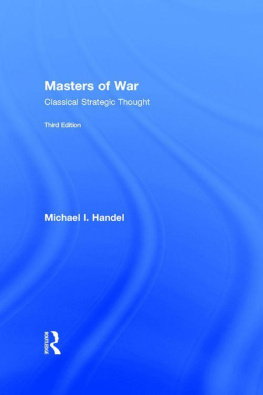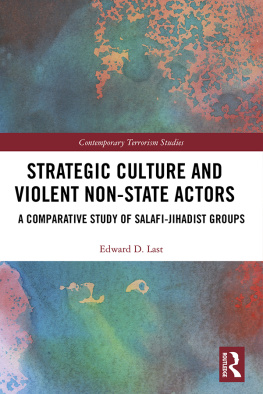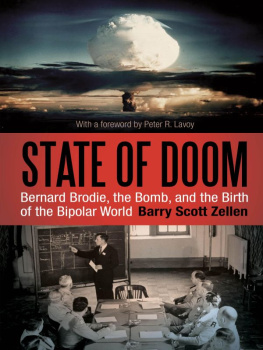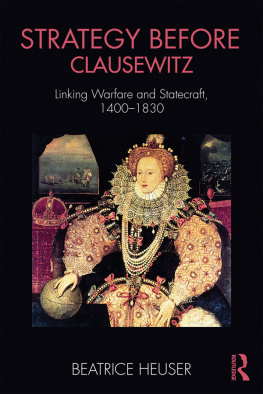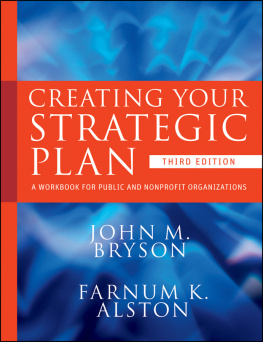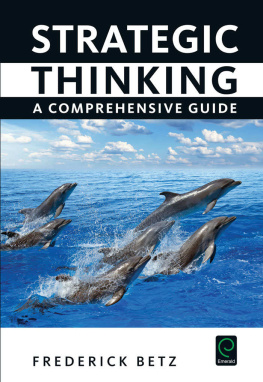MASTERS OF WAR
By the same author
Israels Political-Military Doctrine (1973)
Weak States in the International System (1981)
The Diplomacy of Surprise (1981)
Clausewitz and Modern Strategy (ed.) (1986)
Strategic and Operational Deception inThe Second World War (ed.) (1987)
Leaders and Intelligence (ed.) (1988)
War, Strategy and Intelligence (1989)
Intelligence and Military Operations (ed.) (1990)
MASTERS OF WAR
Classical Strategic Thought
MICHAEL I.HANDEL
Professor of Strategy, US Naval War College
THIRD REVISED AND EXPANDED EDITION

FRANK CASS
LONDON PORTLAND OR.
First published in 1992
This edition published in the Taylor & Francis e-Library, 2005.
To purchase your own copy of this or any of Taylor & Francis
or Routledges collection of thousands of eBooks please go to
http://www.ebookstore.tandf.co.uk/.
Second edition published in 1996
Third revised and expanded edition published in 2001 in Great Britain by FRANK CASS PUBLISHERS Crown House, 47 Chase Side, Southgate, London N14 5BP
and in the United States of America by FRANK CASS PUBLISHERS c/o ISBS, 5824 N E
Hassalo St Portland, Oregon 972133644
Copyright 1992, 1996, 2001 Michael I.Handel
British Library Cataloguing in Publication data Handel, Michael Masters of War: classical strategic thought. 3rd edn. 1. Sun Zi 2. Clausewitz, Carl von, 17801831 3. Military art and scienceHistory I. Title 355'.02 09
ISBN 0-203-01774-9 Master e-book ISBN
ISBN 0-7146-5091-9 (Print Edition) (cloth)
ISBN 0-7146-8132-6 (paper)
Library of Congress Cataloging-in-Publication data Handel, Michael I. Masters of War: classical strategic thought/Michael I.Handel. 3rd rev. and expanded edn. p. cm. Includes bibliographical references and index. ISBN 0-7146-5091-9 (cloth).ISBN 0-7146-8132-6 (paper) 1. Military art and scienceHistory. 2. Sun-tzu, 6th cent. B.C. Sun-tzu ping fa. 3. Clausewitz, Carl von, 17801831. Vom Kriege. 4. Jomini, Antoine Henri, baron de, 17791869. Prcis de lart de la guerre. I. Title. U27.H36 2000 355.02dc21 00035874
All rights reserved. No part of this publication may be reproduced, storedin or introduced into a retrieval system or transmitted in any form or byany means, electronic, mechanical, photocopying, recording or otherwise,without the prior permission of the publisher of this book.
Third Revised and Expanded Edition
To Jill,Yael, Benjamin, Ethan and Sarah
Contents
List of Maps, Figures, and Tables
PULLOUT MAPS AND CHARTS
FIGURES
TABLES
Shortly after the third edition of Masters of War was published, Frank Cass Publishers learned with great regret that Professor Michael Handel died on 14 June 2001. His professional life was dedicated to the study of international relations, strategy and intelligence and their effects on international politics and political and military strategy. He was Professor of Strategy at the US Naval War College from 1990 to 2001.
Acknowledgements
There cannot be a more exciting and creative place for thinking about, writing on, and teaching strategy than the Department of Strategy and Policy at the U.S. Naval War College. For their stimulating discussions and strategic excitement I thank all of my civilian and military colleagues past and present. I am particularly indebted to the Chairman of the Department, Professor George W.Baer, without whose support I could not have brought this new edition into print.
The development and growth of the third edition of Masters of War owes much to Professor Bradford A.Lee, for a number of comments and suggestions and for elaboration of his concept of the theory of victory; to Professor David E.Kaiser, for many arguments on various issues in On War, especially our discussions on Clausewitzs trinitarian analysis; to Professor William C.Fuller, for his comments on the Weinberger Doctrine, and the culminating point of victory in Napoleons invasion of Russia; to Professor John H.Maurer, particularly for a number of comments on ; Professor Alberto R.Coll, for his valuable advice and for sharing unusual travel adventures; and Professors Steven T.Ross, Thomas M.Nichols, Thomas G.Mahnken, Andrew R.Wilson, and John A.English. Among my military friends and colleagues I would like to thank in particular Captain Bryan Lucas, Captain Robert E.McCabe, Commander (Ret.) Lisa B.Squire, Colonel Neil Hartenstein, Captain James P.Butler, Captain Dorothy K.Grant, and my friend Captain (Ret.) James ORourke.
I have also benefited greatly over the years from the challenging arguments and tough questions posed by American and foreign students, particularly in my Clausewitz elective. I cannot fail to mention my student Captain James Dell for giving me the hardest time of them all. He represents so many other students who have made teaching such a rewarding experience.
As always, I would like to thank Professor Richard K.Betts, Director of the Institute of War and Peace at Columbia University, and John Ferris, Chairman of the History Department at Calgary University, for their encouragement and support. In the United Kingdom, I would like to express my gratitude to RAF Official Historian Sebastian Cox, for his good advice, gracious hospitality, friendship, and humor; Professor Andrew Lambert of Kings College, London, for his comments on , especially Corbetts work; my publisher, Stewart Cass, for his encouragement and support; and my editor, Andrew Humphrys, for his dedication.
In addition, I would like to thank all of the librarians at the U.S. Naval War College for their cheerful and efficient help with my research and numerous queries.
Finally, I want to thank my wife, Jill, for her inspired insights, criticism, and editorial help. This book is dedicated to her and to our children, Yael, Benjamin, Ethan, and Sarah, with all of my love and gratitude.
MICHAEL I.HANDEL
Department of Strategy and Policy
U.S. Naval War College
Newport, RI
June 2000
And as water has no constant form there are in war no constant conditions.
Sun Tzu, The Art of War
War is more than a true chameleon that slightly adapts its characteristics to the given case.
Clausewitz, On War
Introduction
When first comparing the works of Sun Tzu and Carl von Clausewitz, I assumed that these two great theorists of war represented what scholars have traditionally held to be the radically different Eastern and Western approaches to the art of war. Yet after a careful study of these two opposing paradigms, I concluded that the basic logic of strategy, like that of political behavior, is universal. To say otherwise would be akin to asserting that Russia, China, Japan, and the United States each follow distinct theories of physics or chemistry. Nevertheless the logic of war also differs from that of the natural sciences because it is based, as Jomini aptly put it, on nothing but usages, the principles of which are unknown to us. That is to say, the conduct of war is based less on a formally developed theory and more on intuition, experience, and an understanding of the rules or laws of action.
The development of the study and theory of war is (and probably will always remain) in a pre-Newtonian, pre-scientific, or non-formal stage. However, even as the laws of gravity operated irrespective of their discovery by Newton, the universal logic of war still exists whether or not it is codified. In the absence of a formal strategic theory, political groups or states have had to construct one based on their own historical experiences and particular strategic and geographic environments. As this book shows, however, despite the fact that each political group or state developed its own strategic concepts, none could defy the as yet unarticulated universal logic of strategy with impunity; this in turn meant that they independently and ineluctably arrived at similar conclusions.
Next page
